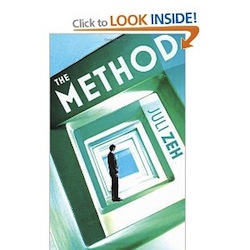 Published: 2012
Published: 2012
Author: Juli Zeh
Translated by: Sally-Ann Spencer
An intriguing premise that doesn’t entirely hold interest
If there’s one thing that’s bound to give you a good laugh it’s a German novel set sometime in the not too distant future when all aspects of a person’s life and health are controlled by the state. Oh wait, no. Exactly the opposite is bound to be true and the reason why such a book is likely to be way down on my to be read pile. If it even made it there at all. But, thanks to a very open minded book group, The Method by Juli Zeh made it to the top of my reading list.
Scientist Mia Holl is a model citizen in a state where the population’s lives are controlled by a system called The Method. The first duty of the citizen is to maintain perfect physical health and to that end they must submit details of their sleep patterns and medical records to the authorities. Sexual relationships are controlled by permits to ensure that children are borne only to parents who are genetically compatible, crimes such as smoking and drinking alcohol are punishable by re-education programmes and living in a completely hygienic and sterile environment is rewarded by the state. Mia finds herself at odds with the rulers when her brother dies in custody after being accused of committing murder.
The idea of how much control a state can or should exert over its citizens’ well-being is fascinating to me. Where does the state’s role in creating a healthy environment end and an individual’s self-determination and responsibility begin? It’s clear that in The Method there is no concept of self-responsibility or any kind of choice for individuals and for the most part people seem to be happy to lose a large degree of liberty in return for guaranteed physical health. Through Mia’s increasing disillusionment with the state and The Method we see how fragile this acquiescence actually is.
The book was thought-provoking and for the first half utterly compelling but then I stopped caring very much. This is a battle of wills and ideological ideals as set out in the dialogue between Mia and pro-Method journalist Heinrich Kramer and for the for hundred or so pages this is a sparkling exchange of ideas, but once the arguments are set out Zeh ends up repeating herself and I found myself wanting her to move on with the narrative.
It didn’t help my enjoyment of the novel that I wasn’t especially keen on Mia and I found myself wondering if I would have been more engaged with the story had the main protagonist been junior judge Sophie, a highly sympathetic character who believes in The Method yet retains her humanity throughout.
I loved mulling over the issues that The Method raises – is it really such a bind to submit to a prescribed exercise regime in return for living in a country with no cancer – and challenging my libertarian principles. Zeh also nicely explores how easily people can turn against the regime given the right figurehead, making me consider the politics of personality.
As a stimulus to consider a dystopian future and how close we are to such a future The Method worked very well. As a novel and piece of entertainment I wasn’t quite as gripped throughout as I was at the beginning and can’t help feeling that a short story or novella would have conveyed the message much better.

